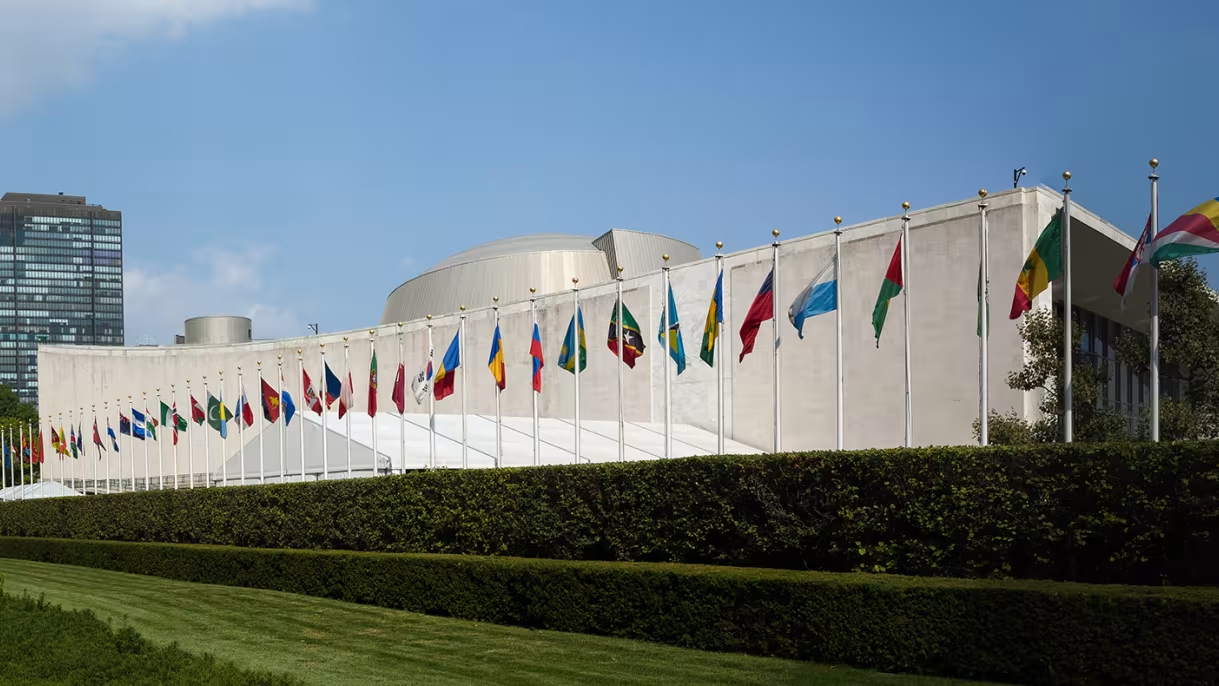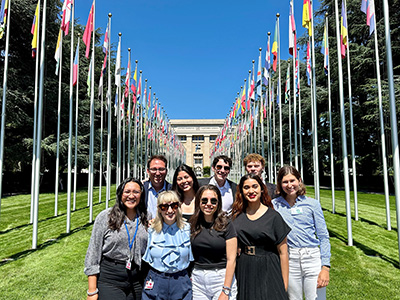

Policy Advocacy Clinic Team Formally Submits Report to U.N. Human Rights Committee
Two months after traveling to Geneva, Switzerland, to present before the United Nations Human Rights Committee (CCPR) regarding U.S. compliance with the International Covenant on Civil and Political Rights (ICCPR), a Princeton Policy Advocacy Clinic team joined the American Civil Liberties Union in formally submitting their report on the matter to the Committee.
 SPIA’s Policy Advocacy Clinic immerses students in the policymaking process by teaching them how to find public policy solutions for social problems and then engaging them in advocacy campaigns to advance those policies. It is the first program of its kind in higher education, and the report to the Human Rights Committee is the Clinic’s first public submission.
SPIA’s Policy Advocacy Clinic immerses students in the policymaking process by teaching them how to find public policy solutions for social problems and then engaging them in advocacy campaigns to advance those policies. It is the first program of its kind in higher education, and the report to the Human Rights Committee is the Clinic’s first public submission.
“I've always been passionate about putting my efforts to good use, and the fact that work my classmates and I did last semester and over the summer has turned into something much more important than a paper makes that work significantly more meaningful,” said Grecia Hernandez Perez ’24, who worked on the project.
The U.S. ratified the ICCPR in 1992. The accord is a key international human rights treaty that provides a range of protections for civil and political rights, such as the right to human dignity, equality before the law, and freedom of speech, assembly, and association. It is considered one of the core components of the International Bill of Human Rights. The Human Rights Committee is set to review the United States’ conformity with the ICCPR this month. On behalf of the ACLU Human Rights Program, the Clinic team produced a 158-page memo on how the Committee should assess the U.S. record on eight issue areas related to the criminal legal system, what questions the Committee should ask the U.S. during its review, and what policy recommendations the Committee should submit to the U.S.
In their submission, the Clinic team and the ACLU addressed nine components of the U.S. criminal legal system. It covered issue areas that the Human Rights Committee had previously recommended for the United States to address as well as cutting-edge issues that are new to the Committee and fall under the treaty’s jurisdiction.
“While the ICCPR was ratified nearly 30 years ago, the United States has yet to fully comply with the treaty,” the submission stated. “In fact, in certain areas such as the criminal legal system — the focus of this submission — the United States has grossly violated its obligations and failed to take the appropriate steps to build the domestic infrastructure necessary to fulfill its human rights commitments.”
“The United States touts itself as a beacon of democracy and human rights, yet the reality here at home is very painfully different, especially for communities of color and other marginalized groups,” said Jamil Dakwar, director of the ACLU’s Human Rights Program. “The upcoming U.N. review offers the United States yet another opportunity to make commitments and take further action to eliminate systemic racism in the criminal legal system and invest in communities and humane alternatives to carceral systems, militarization, surveillance, racist policing, and extreme punishments.”
The submission included 54 recommended questions for the CCPR to ask the United States during its review, as well as 63 policy recommendations for the CCPR to make to the U.S. The subject matters covered by the Clinic and the ACLU in the submission include:
- Use of facial recognition technology by law enforcement
- Disciplinary and policing practices in schools
- Use of force by law enforcement
- Arrest and sentencing practices in drug enforcement
- Pretrial detention and cash bail
- Solitary confinement
- Death penalty
- Voting rights in the context of felony disfranchisement
- Prison labor
“I am proud of the work of the Princeton Policy Advocacy Clinic students to engage with policymakers in the United Nations in a review of the United States’ record under this important human rights treaty,” said Udi Ofer, the John L. Weinberg Visiting Professor and Lecturer of Public and International Affairs, and the founding director of the Policy Advocacy Clinic. “From studying policy advocacy theory and the policymaking process to developing the skills necessary to engage in sophisticated policy analysis and campaign planning, the Policy Advocacy Clinic is preparing the next generation of thinkers and doers who will help shape future policymaking in the United States and globally.”
“The Policy Advocacy Clinic showcases our commitment to training students for careers in public service,” said SPIA Dean Amaney Jamal. “By offering them the opportunity to formally submit recommendations to the policy community both locally and globally, we are able to promote our values ‘in service of the nation and humanity.’ The Clinic brings together our state-of-the-art curriculum alongside new opportunities for policy engagement. I am grateful and proud of Professor Udi Ofer and our students for this major accomplishment.”
In 2022-23, its first year, Policy Advocacy Clinic students worked on three project teams, including on juvenile justice reform in Congress and police accountability in New Jersey. This year’s projects are again including policy advocacy on the international, federal, and state levels, with a focus on criminal justice reform.
“It is one thing to sit in a classroom and talk about theoretical change but a completely different experience to influence change at the international level,” said Matthew Farrell ’24. “[This experience] has been incredibly transformative for both my academic and professional aspirations.”

